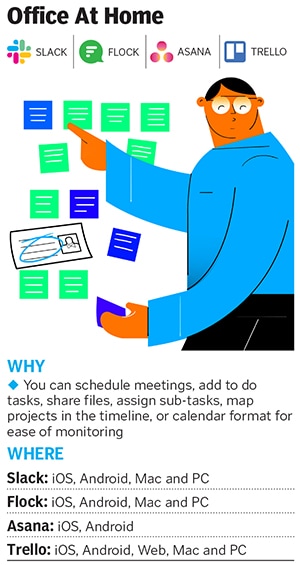
Post Covid-19, can work from home become the new normal?
As India is forced to experiment with what has long believed to be the future of work—so far only in theory—here's how remote work culture could pan out for companies, and people, across the country
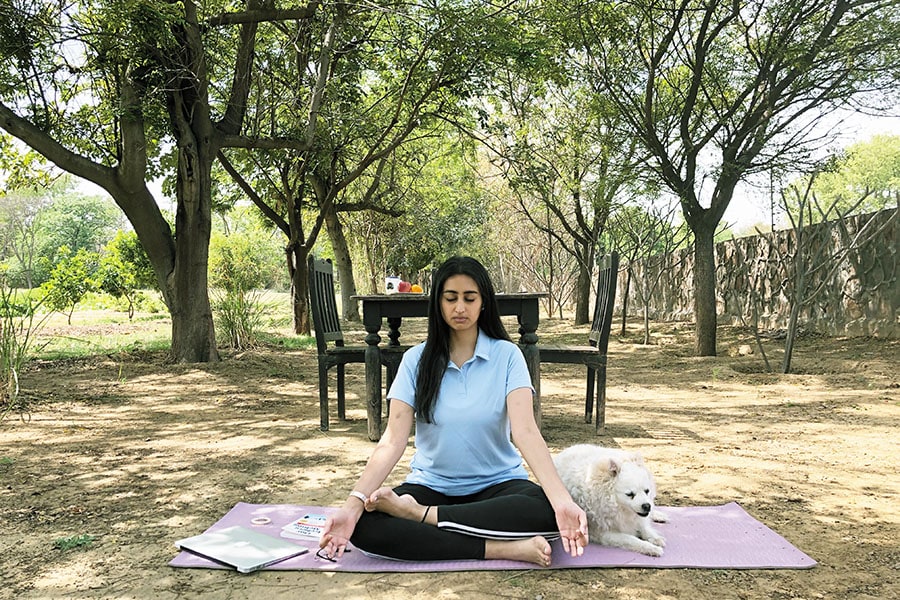 We are doing regular phone calls, webinars and Zoom sessions, but since ours is a business with a corpus of money involved, neither party is comfortable exchanging hands without a face-to-face interaction: Sonali Thapar, director, TCAP Investments
We are doing regular phone calls, webinars and Zoom sessions, but since ours is a business with a corpus of money involved, neither party is comfortable exchanging hands without a face-to-face interaction: Sonali Thapar, director, TCAP InvestmentsImage: Shivani Thapar
When ‘Where should we go for dinner?’ has been swiftly replaced with ‘Zoom, Google Meet or House Party?’, it isn’t surprising that Bengaluru-based Arjun Mehra has to log on to a video conference app to collaborate with his colleagues. What’s unusual, though, is the nature of his work: Mehra, a content writer by day, moonlights as an improv comic. His troupe typically performs one or two live shows a week, and, like the rest of the world, is grappling with how to ‘work from home’ during the Covid-19 lockdown.
“We’re live entertainers and we do improv [or improvised] theatre, which you obviously need to perform on a stage, in front of an audience—or so we thought,” says Mehra. “For a lot of us, theatre isn’t our primary source of income, but with shows a couple of times a week, it is additional revenue. But even besides that, we wanted to find ways to continue practising, putting out our acts. With the lockdown, we had to stop all rehearsals and workshops. But very quickly, we saw that a lot of the improv community around the world had gravitated towards doing things online.”
Mehra’s routine now involves logging in to video conference app Zoom to rehearse with his colleagues each night, a troupe called Improv Comedy Bangalore, of which he is the artistic director. “It works fairly similarly to as it would on stage,” he says. “There are differences, of course—you can’t feed off each other’s energies, take physical cues or use body language—but on Zoom, we’re focusing a lot more on facial expressions, vocal exercises and accents; it’s a whole different genre, and it’s really exciting for us to challenge ourselves with it.”
That’s not all—the troupe is putting on its first show at the time of writing this piece. They’ve publicised it through social media and will have an online audience tune in to watch their live show. Particularly in improv, the audience plays a key role—suggesting situations, characters and storylines, challenging the comedians to stage fresh, on-the-spot acts. On Zoom, while only the comics will have their videos displayed, the audience will be able to engage over a chat, and a full-time moderator will pass on their suggestions to the cast. While there isn’t an applause feature, Zoom lets you ‘raise your hand’ during a call, which the comics will translate to claps. The show won’t be ticketed, but the audience can send in donations, which will go to NGO GiveIndia, currently raising money for those hit by Covid-19.
Mehra’s story is one of many Indians who have had to quickly adapt to make sure work—and business—continues even during the lockdown. With infection numbers steadily rising, social distancing threatens to extend into a short-term way of life, and companies are coming to terms with a remote working culture for the interim.
While the ‘work from home’ concept has been popularised by many Silicon Valley tech giants, it has yet to catch on in India as a regular feature, even in the more agile startup space. In its current form, the option to work remotely was largely being offered to gig workers; it was unavailable to most full-time staff, unless the location demanded it. But India Inc had to change course almost overnight: The coronavirus infection was beginning to spread across cities in the early days of March and going to work, which would often involve taking public transport and passing through crowded, communal spaces, quickly became contentious.
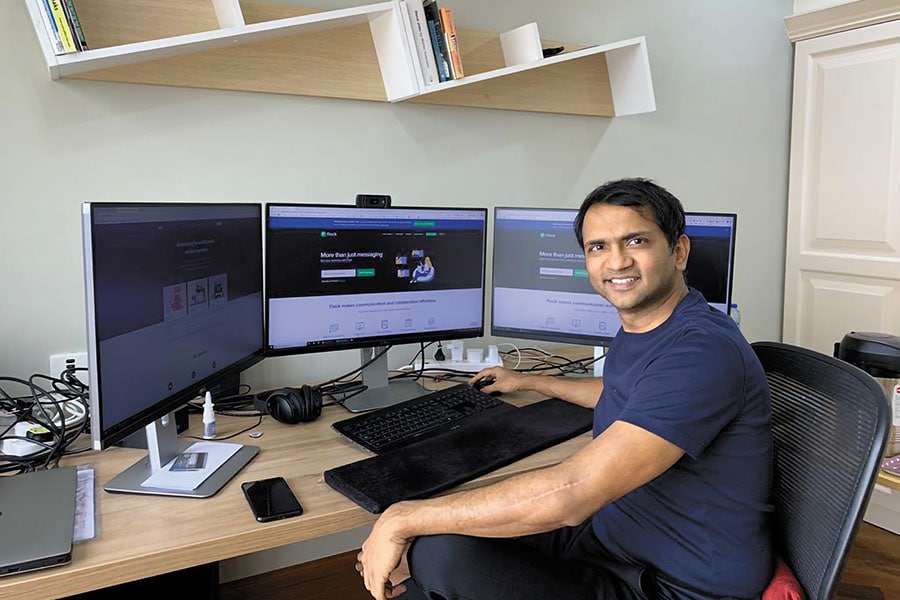 In the remote environment, we don’t want to lose the sense of relationships and the culture either: Bhavin Turakhia, founder-CEO, Flock
In the remote environment, we don’t want to lose the sense of relationships and the culture either: Bhavin Turakhia, founder-CEO, FlockEven before Prime Minister Narendra Modi declared a complete lockdown from March 25, companies were beginning to see the threat, manifesting first just as extra sanitisation measures around the workplace. In just a few days, as the number of Covid-19 cases rose, many organisations worried that the highly contagious infection could put their employees at risk. When the country-wide shutdown was announced, these companies had to think on their feet, granting access and assets to employees to sign in—and be as productive as possible—without showing up.
“We’re being forced into the world’s largest work-from-home experiment and, so far, it hasn’t been easy for a lot of organisations to implement,” writes Saikat Chatterjee, senior director, advisory at research firm Gartner, on the company’s website. “In a recent webinar snap poll, 91 percent of attending HR leaders (all in Asia-Pacific) indicated that they have implemented ‘work from home’ arrangements since the outbreak, but the biggest challenge stems from the lack of technology infrastructure and lack of comfort with new ways of working.”
Gartner, in the article, adds that the vast remote work experiment is also ‘a great opportunity to prepare for the future’. According to its recent research, by 2030, the demand for remote work will increase by 30 percent due to the Generation-Z fully entering the workforce; it adds that 64 percent of today’s professionals say they could work anywhere and remote work policies are in place at 71 percent of organisations.
 You need to interact with customers in real time to see what’s working and what isn’t: Rohina Anand Khira, owner, AA Living
You need to interact with customers in real time to see what’s working and what isn’t: Rohina Anand Khira, owner, AA LivingThe reality for India, however, is different. “It’s difficult for me to put a number to it, but I would say our readiness as the Indian industry would be close to 5 percent, definitely not more than 10 percent, in terms of the capacity that exists today to support work from home,” says Kiran Bhagwanani, CEO—South Asia of NTT Ltd, a global technology services company that has also been assisting companies in setting up tech infrastructure to make the transition. “It will never become 100 percent—and it’s not meant to be 100 percent—but if we can get to 20 to 30 percent in the long run, that would be positive.”
The upsides of working remotely are many, as employees are beginning to see. You don’t need to have woken up at dawn to fix a healthy breakfast, squeezed in a workout, washed-conditioned-dried your hair, got your kids ready and dropped off to school, and scarfed down the said breakfast, all before 8 am, to make it to work on time. Then, of course, there’s that soul-crushing commute. At home, you can multi-task your chores through the day while you work—and minus the dreaded commute time to add hours to your day.
“I’ve done some of the most valuable work of my career from home, and I quickly realised that going to office is a bit of a corporate scam,” says Raheel Khursheed, cofounder of a streaming infrastructure platform called Laminar Global, who has been working remotely for the better part of a decade, and says he has left money on the table because “nothing would convince him to go back to working at an impersonal glass building”.
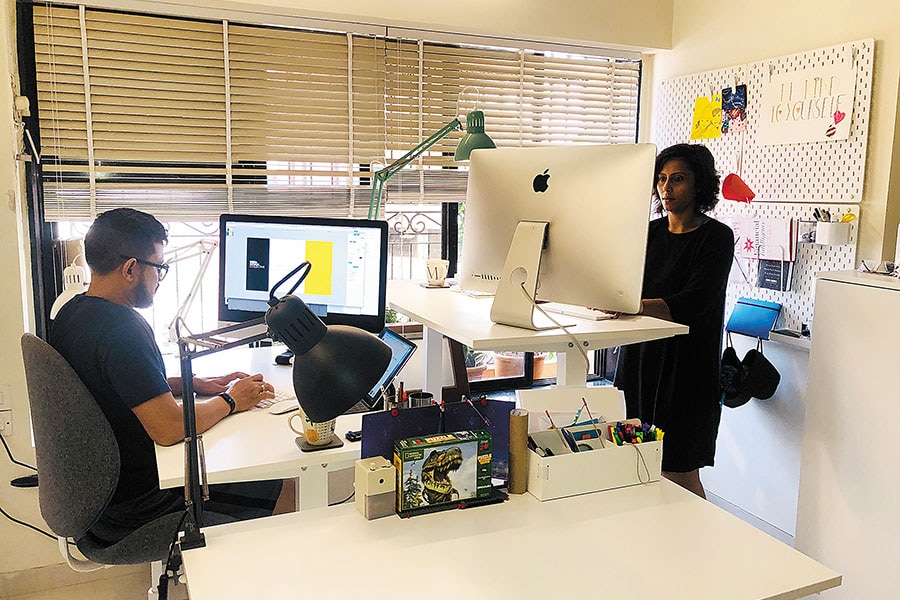 My husband and I have been working from the same space for six years, and with time and mutual respect, we have been able to work and live together. Equality both at work as well as in household chores is essential to keep this balance: Upasana Nattoji Roy, short film maker & designer
My husband and I have been working from the same space for six years, and with time and mutual respect, we have been able to work and live together. Equality both at work as well as in household chores is essential to keep this balance: Upasana Nattoji Roy, short film maker & designer“Depending on where you are on the privilege ladder, you’re spending two to four hours a day commuting to work, maybe more. Your day begins in a manic rush,” he says. “Now, I can do things at my own pace. In the mornings, I make myself a nice breakfast, listen to a podcast, listen to music or just listen to the stillness of the morning. I start to work by 9.30 am and get solid three hours in before lunch, as I would in an office. Then I work again from 2 pm till evening.”
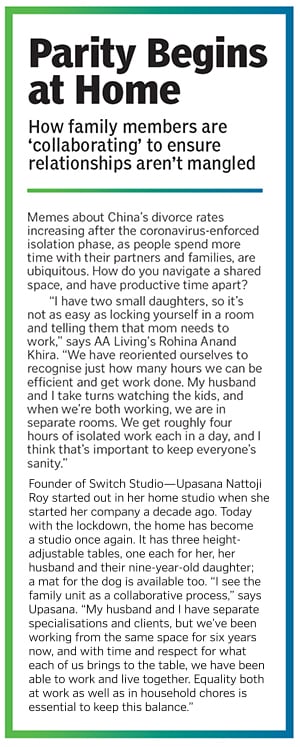
Khursheed says he dedicates certain days of the week to calls and meetings, so he isn’t working in ‘complete isolation’ either. He’s discovered a penchant for cooking and makes himself three meals a day. “From my own experience, I do feel that what we’re witnessing is a fairly critical watershed moment for working from home and a lot of people are very, very quickly going to realise that a lot of non-service jobs that are not location-based can be done from home. And people will make that switch,” he says.
Some sectors are more suited to this culture than others, of course. Nimble, young and technology-oriented companies are more likely to see a seamless transition, while traditional industries are facing obstacles.
For Delhi-based Sonali Thapar, director of Thapar Group's family office and investment arm TCAP (Thapar Capital), social distancing is not helping business. The Thapar group consists mainly of brick-and-mortar manufacturing businesses, and the more recent family office venture invests in companies across asset classes. Sonali handles startup investing, with a portfolio of 18 companies that range from energy and F&B to media and artificial intelligence.
“As a group, we’ve been in hardcore manufacturing, so working from home has never been an option,” she says. "A traditional business also means you have a lot of conservative, older employees working with you. The average age of our team is above 50. They’re trying to adapt to technological solutions such as Zoom, and I’m happy to help them. The answer isn’t always to hire young—these people are great at what they do. We are doing daily video conferences and attending webinars to stay connected and support each other.”
As an active angel investor, Thapar invests in startups based on their concept, capability and culture. A significant part of that can be assessed over the phone. However, the true picture, she says, comes together when the founder is seated across the table, allowing her to gauge the important soft skills required when running a company—which one can’t evaluate when both parties “work from home”.
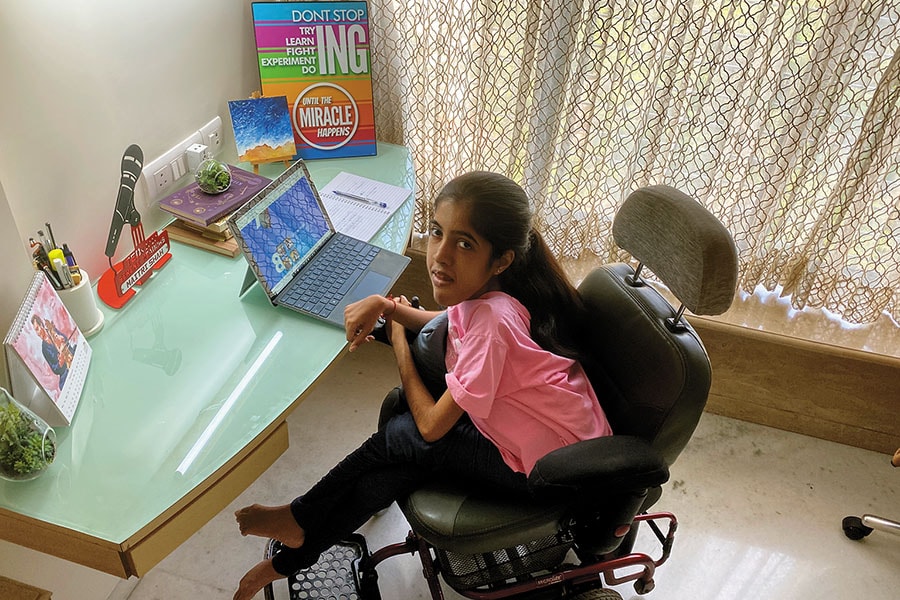 India has 150 million people 27 with disabilities, of which 70 million are employable; but 98 percent remains unemployed. That’s a lot of untapped talent: Maitri Shah, founder-CEO , Mind Assets
India has 150 million people 27 with disabilities, of which 70 million are employable; but 98 percent remains unemployed. That’s a lot of untapped talent: Maitri Shah, founder-CEO , Mind AssetsSimilarly, Rohina Anand Khira, the Mumbai-based owner of home décor brand AA Living, says that even in the age of ecommerce, solid retail requires physical touchpoints. “You need to interact with customers in real time to see what’s working and what isn’t,” says Khira, who also doubles as a social media influencer. “It could be something as simple as why isn’t there more yellow in the collection—that’s vital customer feedback that people aren’t going to email you for. Being on the shop floor is important. There’s not much I can ask my staff to do from home.”
While both Khira and Thapar don’t believe this can be a sustainable way of working at their firms going forward, they are both finding ways to enjoy the downtime personally. Khira, who has two young daughters, says the silver lining is that she and her husband have focussed on getting healthier, eating clean, working out, cooking meals and meditating together. Thapar, who lives on a farmhouse in Delhi, is using the additional time otherwise spent commuting, to feed stray dogs and learning to code so she can be better informed for future technology-focussed business investments.
“Also, I’m getting to bond with my colleagues, which is nice,” Thapar says. “I’m checking in with them to see how they and their families are doing.”
(This story appears in the 30 November, -0001 issue of Forbes India. To visit our Archives, click here.)



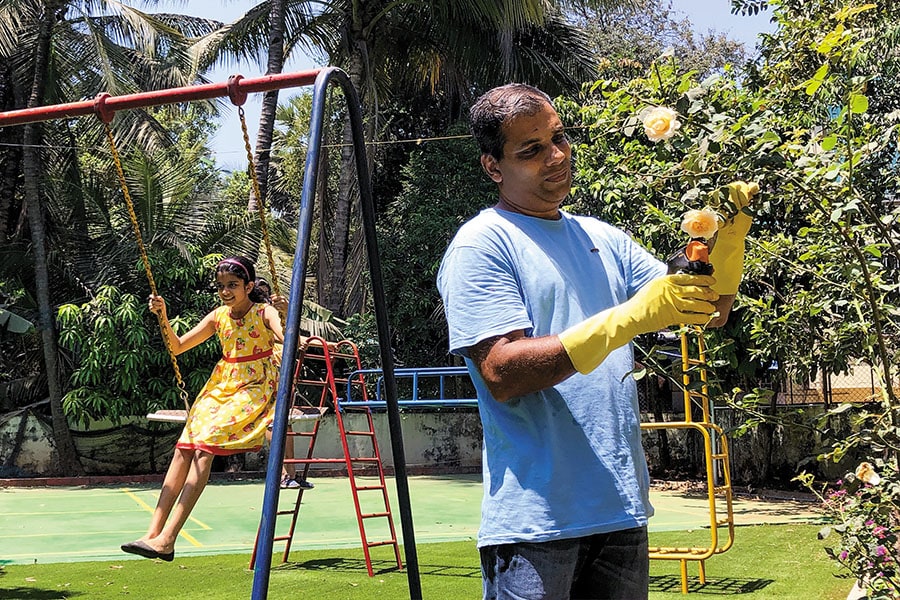 The moment you are not in office, your career path is impacted. But I have no regrets: Jibu Thettayil, solutions architect WITH L&T
The moment you are not in office, your career path is impacted. But I have no regrets: Jibu Thettayil, solutions architect WITH L&T